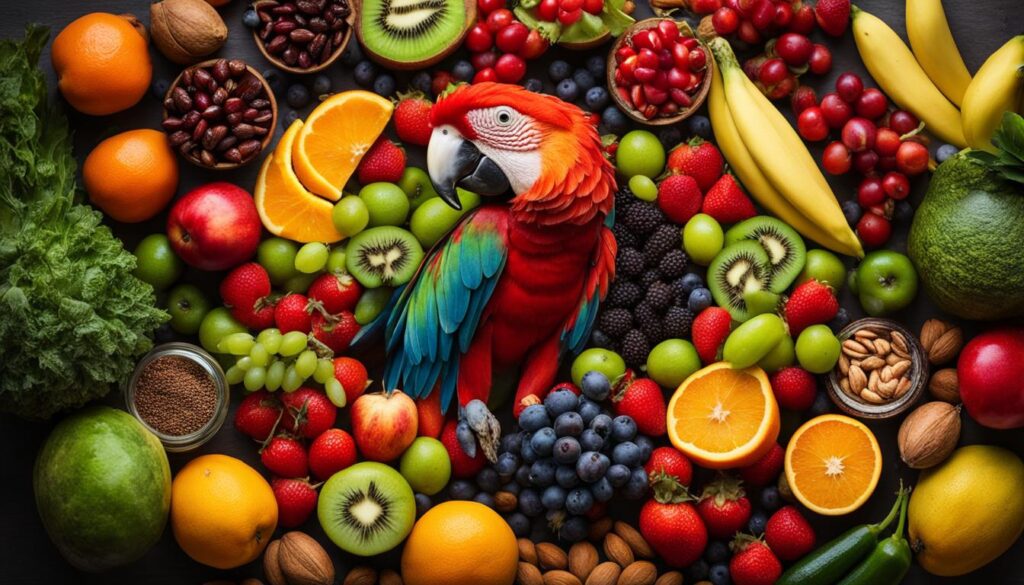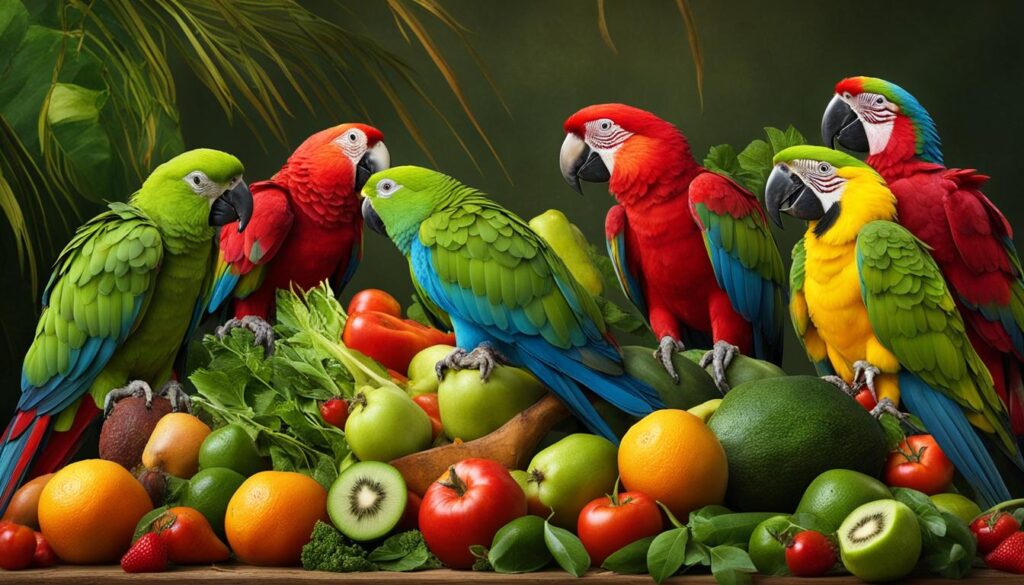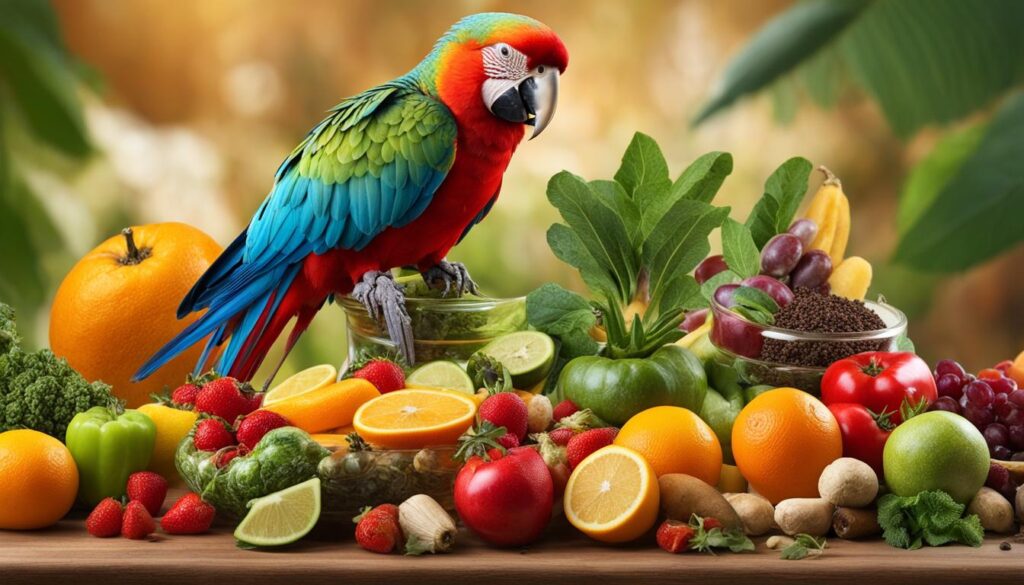A Healthy Beakful: Mastering Parrot Nutrition for Vitality and Longevity
Parrots are unique and vibrant creatures that bring joy and companionship to our lives. As parrot owners, it is our responsibility to ensure their well-being, and a crucial aspect of that is their diet. Proper nutrition plays a significant role in the vitality and longevity of our feathered friends. By understanding their nutritional needs and implementing balanced feeding practices, we can provide them with the best care possible.
Key Takeaways:
- Parrots have specific nutritional needs that must be met for optimal health and longevity.
- A balanced diet is essential and should include a variety of fruits, vegetables, grains, and protein sources.
- Avoid feeding parrots foods that are toxic or harmful to their health.
- In some cases, additional supplementation may be necessary, but it is crucial to consult with an avian veterinarian.
- Regular consultations with an avian veterinarian can ensure that a parrot’s diet is tailored to their individual needs and address any health concerns.
The Importance of a Balanced Parrot Diet
A balanced diet is crucial for the overall health and well-being of parrots. They require a variety of nutrients, including proteins, carbohydrates, fats, vitamins, and minerals, to support their bodily functions. A lack of these essential nutrients can lead to malnutrition and various health issues in parrots. It is essential to provide a diverse range of foods to meet their dietary requirements and promote optimal health.
Parrots, like other avian species, have unique nutritional needs that differ from those of mammals. Their high metabolic rates and active lifestyles demand a diet rich in energy and nutrients. Here are the key reasons why a balanced parrot diet is essential:
- Overall Health: A well-balanced diet supports their immune system, helps maintain a healthy weight, and reduces the risk of diseases.
- Optimal Growth and Development: Proper nutrition is vital for young parrots to develop strong bones, feathers, and beaks.
- Mental and Emotional Well-being: Feeding your parrot a varied diet keeps them mentally stimulated, promoting natural foraging behaviors and preventing boredom.
- Longevity: A balanced diet can contribute to a longer lifespan for your feathered companion.
To ensure your parrot receives all the necessary nutrients, it is important to offer a diverse range of foods. Here is a table highlighting the essential nutrients and their sources for a balanced parrot diet:
| Nutrient | Sources |
|---|---|
| Proteins | Lean meats, legumes, nuts, and seeds |
| Carbohydrates | Fruits, vegetables, whole grains |
| Fats | Nuts, seeds, avocados, healthy oils |
| Vitamins | Fresh fruits and vegetables, fortified pellets |
| Minerals | Greens, nuts, seeds, mineral blocks |
It is important to note that some foods can be toxic or harmful to parrots. For example, avocado, chocolate, caffeine, and alcohol should never be fed to your feathered friend. Always research the safety of specific foods before offering them to your parrot.
Remember, maintaining a balanced parrot diet requires careful monitoring and occasional adjustments. Regular consultations with an avian veterinarian can help ensure your parrot’s nutritional needs are met, and any potential health concerns are addressed.

Next, we will delve deeper into understanding the specific nutritional needs of parrots and how to create a well-balanced diet tailored to their requirements.
Understanding Parrot Nutritional Needs
Parrots have specific nutritional needs that must be met to ensure their well-being. It is essential to provide them with a well-balanced diet that includes a variety of fresh fruits, vegetables, grains, and protein sources. Additionally, parrots require a calcium-rich diet to support strong bones and beaks. By understanding the specific nutritional needs of different parrot species, we can create an optimal feeding plan that promotes their health and vitality.
Feeding parrots a balanced and nutritious diet is crucial for their overall well-being. Here are some key components of a healthy parrot diet:
- Fresh Fruits: Including a variety of fruits in their diet ensures that parrots receive essential vitamins and minerals. Fruits such as apples, bananas, berries, and oranges are excellent choices.
- Vegetables: Offering a selection of vegetables provides parrots with additional nutrients and fiber. Some suitable options include carrots, broccoli, kale, and bell peppers.
- Grains: Whole grains like quinoa, brown rice, and whole wheat pasta can be included to provide carbohydrates and essential nutrients.
- Protein Sources: Parrots need protein for growth and maintenance. Incorporating lean protein sources such as cooked chicken, boiled eggs, or legumes into their diet is essential.
Calcium-Rich Foods for Strong Bones and Beaks
In addition to the above components, parrots require a calcium-rich diet to support the health of their bones and beaks. Calcium can be provided through foods like kale, broccoli, collard greens, and fortified pelleted diets specifically designed for parrots. Ensuring an adequate intake of calcium is crucial to prevent deficiencies and maintain their overall well-being.
“A well-balanced diet is the foundation for optimal parrot feeding and nutrition.” – Dr. Emma Carter, Avian Veterinarian
Meeting the nutritional needs of parrots through a balanced diet is essential for their overall health and well-being. However, it is important to note that individual parrots may have specific dietary requirements based on factors such as age, species, and health conditions. Consulting with an avian veterinarian is highly recommended to tailor the diet to your parrot’s specific needs.
| Food Group | Examples |
|---|---|
| Fresh Fruits | Apples, bananas, berries, oranges |
| Vegetables | Carrots, broccoli, kale, bell peppers |
| Grains | Quinoa, brown rice, whole wheat pasta |
| Protein Sources | Cooked chicken, boiled eggs, legumes |
Creating a Balanced Parrot Diet
When it comes to feeding parrots, offering a diverse range of foods is essential for maintaining a healthy bird diet. Our feathered friends require a combination of fresh fruits and vegetables, whole grains, nuts and seeds, and lean proteins to thrive. By providing a varied diet, not only do we ensure they receive all the necessary nutrients, but we also keep them mentally stimulated and engaged.
Parrots are known for their incredible intelligence, and offering a variety of foods allows them to explore different tastes, textures, and colors. It’s like a culinary adventure for them, ensuring they never get bored with their meals. Imagine a plate filled with nutritious fruits like apples, berries, and oranges, accompanied by a colorful mix of vegetables such as carrots, broccoli, and bell peppers.
Just like us, parrots enjoy a well-balanced diet that appeals to their senses and provides them with the nutrition they need to thrive.
While feeding parrots, it’s important to avoid certain foods that can be toxic or harmful to their health. This includes avocados, chocolate, caffeine, and alcohol. These substances can have severe adverse effects on their well-being and should never be a part of their diet.
Ensuring a balanced parrot diet also involves offering suitable portion sizes for different food groups. This way, we can prevent overfeeding and maintain a healthy weight for our feathered companions. It’s important to consult with an avian veterinarian or professional bird dietitian to determine the right quantities for each food group based on the specific needs of your parrot.

Making Healthy Choices for Parrots
Here are some key elements to consider when creating a balanced parrot diet:
- Include a variety of fresh fruits and vegetables rich in vitamins and minerals.
- Incorporate whole grains such as quinoa and brown rice for added fiber.
- Offer nuts and seeds as a source of healthy fats and essential nutrients.
- Include lean proteins like cooked chicken or turkey, beans, and lentils.
By following these guidelines, we can ensure our parrots have a well-rounded diet that fulfills their nutritional needs. Remember, a healthy bird diet directly contributes to their vitality and overall well-being. Let’s make feeding parrots a delightful and nutritious experience.
Nutritional Supplements for Parrots
While a well-balanced diet should meet most of a parrot’s nutritional needs, there are situations where additional supplementation may be necessary. Some parrots may have specific deficiencies or health conditions that require extra vitamins or minerals to support their overall well-being. However, it is crucial to consult with an avian veterinarian before introducing any supplements into your parrot’s diet. They can provide guidance on the appropriate parrot supplements and ensure they are safe and tailored to your bird’s specific needs.
Parrot supplements can be beneficial in addressing specific nutritional gaps or supporting the health of parrots with medical conditions. However, it is important to remember that supplements should never replace a balanced diet. They are intended to complement and enhance the nutritional value of your parrot’s regular meals, not serve as a primary source of nutrients.
Choosing the Right Parrot Supplements
When considering parrot supplements, it is essential to opt for high-quality products specifically formulated for avian nutrition. Look for reputable brands that offer vitamin and mineral supplementation tailored to parrots’ unique requirements. Avoid generic or low-quality supplements that may not provide the desired nutritional benefits.
Your avian veterinarian can guide you in selecting the right parrot supplements based on your bird’s individual needs. They may recommend specific vitamins or minerals, such as calcium or vitamin D, to address deficiencies or support bone health.
“Adding parrot supplements to your bird’s diet should always be done under veterinary supervision to ensure the supplements are safe and appropriate for your specific parrot’s needs.”
Introducing Supplements to Your Parrot’s Diet
Before adding any supplements to your parrot’s diet, it is essential to follow your veterinarian’s instructions carefully. They will provide you with guidelines on dosage and administration. It is crucial to measure the supplement accurately and avoid over-supplementation, as excessive amounts of certain vitamins and minerals can be harmful to parrots.
Some parrot supplements may come in powder or liquid form, which can be mixed with the bird’s food or water. Others may be available in the form of treats or chewable tablets. Your veterinarian will be able to recommend the most suitable administration method for your parrot based on their preferences and dietary habits.
Remember, consistency is key when incorporating parrot supplements into your bird’s diet. Follow the recommended schedule provided by your veterinarian to ensure your parrot receives the necessary nutrients regularly.

Conclusion
Providing a healthy and balanced diet is vital for the well-being of your parrot. Understanding their nutritional needs and offering a diverse range of foods ensures they receive the essential nutrients required for vitality and longevity. By tailoring their diet to their specific needs and consulting with an avian veterinarian, you can address any potential health concerns and promote optimal health.
A well-balanced parrot diet consists of a variety of fresh fruits, vegetables, grains, nuts and seeds, and lean proteins. It is important to avoid feeding them toxic or harmful foods, such as avocado, chocolate, caffeine, and alcohol. Offering a varied diet not only ensures they receive all necessary nutrients, but it also keeps them mentally stimulated and engaged.
Regular check-ups with an avian veterinarian allow you to monitor your parrot’s health and make any necessary adjustments to their diet. These professionals can provide guidance on specific nutritional supplements if needed. With proper nutrition, your parrot can enjoy a long and healthy life filled with vibrant colors and joyful squawks.
FAQ
What are the essential nutrients for a parrot’s diet?
Parrots require proteins, carbohydrates, fats, vitamins, and minerals for their overall health and well-being.
What foods should be included in a balanced parrot diet?
A balanced parrot diet should consist of fresh fruits, vegetables, whole grains, nuts and seeds, and lean proteins.
Are there any foods that are toxic or harmful to parrots?
Yes, some foods that are toxic or harmful to parrots include avocado, chocolate, caffeine, and alcohol.
Do parrots require a calcium-rich diet?
Yes, a calcium-rich diet is essential for parrots to support strong bones and beaks.
Should parrots be given nutritional supplements?
Parrots may require specific vitamins or minerals if they have deficiencies or certain health conditions, but it is crucial to consult with an avian veterinarian before adding any supplements to their diet.
How can a well-balanced diet contribute to a parrot’s well-being?
A well-balanced diet ensures that a parrot receives all the necessary nutrients for vitality and longevity and keeps them mentally stimulated and engaged.


